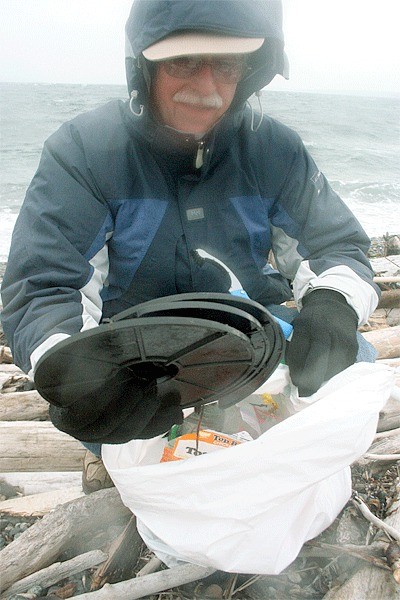Not even the gusting wind and rain could keep a group of stalwart volunteers from getting their hands on the trash at Keystone Spit.
Five Beach Watchers from WSU Extension of Island County pulled on extra coats and gloves and grabbed garbage bags to fill with bits of plastic, flip-flops and remnants of beer bottles Wednesday.
WSU Extension often holds beach clean-up sessions and invites volunteers to join in.
The clean-up groups will become especially vital when debris from the earthquake and tsunami that hit Japan last March begins to arrive on Washington coasts in the next year or two.
A mass of debris measuring 2,000 miles long and weighing up to 20-million tons is expected to hit the Washington coast in late 2013, with some items arriving sooner.
A Russian ship spotted debris near Midway Island last month and the debris is expected to hit Hawaii next year, said Scott Chase, Shore Stewards coordinator and community beach litter coordinator for WSU Extension.
“I hope the Department of Ecology will have the funding to care for it,” Chase said.
Expected Japanese tsunami debris includes refrigerators, wood, boats, TV sets, plastic bottles and parts and more, all of which would be detrimental to marine life.
Meanwhile, there’s plenty of other debris hitting Whidbey’s shores on a daily basis.
“Most of what is picked up is plastic, and plastic is a huge threat to marine animals, fish and birds,” Chase said, adding that the media often reports about animals eating plastics they think are a food source and dying as a result.
“That is one of the prime motivators of the volunteers on the beach: removing the plastics before they are eaten by the marine life,” Chase said.
The program has been going on locally for 13 years and Chase stepped into the leadership position last summer after Cheryl May, the longtime leader, left.
The beach clean-up program is funded by the Washington State Department of Ecology, which receives tax money from bottle and can manufacturers to make up for Washington’s lack of deposit fees on bottles and cans, Chase said.
Last year, the tax generated $6 to $7 million, which local groups can apply for, Chase said.
Groups of up to 10 volunteers generally attend each beach clean-up session and show up regardless of the weather, Chase said as the wind whipped around him, adding that the weather usually isn’t so bad.
Various groups, like members of the Navy and Shell Oil in Anacortes, adopt beaches to keep clean, Chase said. He can arrange for groups to clean up any public beach on the island.
Many retired people choose to help clean beaches, including Beach Watcher Julie Ward.
“It gives them a chance to walk along the beach and get fresh air,” Chase said.
Ward joined Beach Watchers last April. Beach Watchers is a group with members around Puget Sound that study the creatures, resources and landscape of the environment in an effort to preserve it. Training is two days per week for two months.
“I love this environment,” Ward said, adding that she wants to help protect it.
Ward has already logged 60 volunteer hours this year, which includes beach clean-up and other Beach Watcher activities, like teaching children about the salmon life cycle at the outdoor classroom on Maxwelton Creek and teaching about whales at the Coupeville Wharf.
“It’s a friendly organization with a first class education. You really learn a lot. It’s an opportunity to give something to our community,” Ward said.
When Ward heads to the beach to clean up, she said she always finds disposable lighters, to which she responds, “Can’t anybody light a match anymore?”
She finds fishing lures and Styrofoam.
“I always find one flip-flop, never two,” Ward said.
“Mostly, I do it for the critters,” Ward said of her service. “All the food web is connected. Even if I pick up a tiny piece of Styrofoam I go, ‘Oh, that’s bite-sized for some critter.’”
Kes Tautvydas said he often finds mussel discs, used at Penn Cove Shellfish. After collecting a couple hundred discs, Beach Watchers return them to Penn Cove Shellfish and are rewarded with flavorful mussels.
After only 15 minutes of beach combing, Tautvydas had a sizable amount of clutter in his bag, ranging from food wrappers to plastics. He has lived on Whidbey Island for eight years and collects litter every time he walks on the beach.
“If everybody on this island did that, we wouldn’t have as much,” Tautvydas said, adding that he thinks a lot of people do collect litter.
A shiny object in the driftwood caught Tautvydas’ eye. He picked up a counter.
“It’s in perfectly good working condition,” he said, smiling, and pocketed his newfound treasure.
Arrange a group clean-up of public Whidbey Island beaches or join the Beach Litter Free Disposal Program to dispose of litter found on beaches for free by contacting Scott Chase at 360-387-3443, ext. 258 or at schase@wsu.edu.
By joining the Beach Litter Free Disposal Program, you may dispose of accepted litter items for free at North Whidbey Recycle Center, Coupeville Transfer Station and Bayview Recycle Center.



